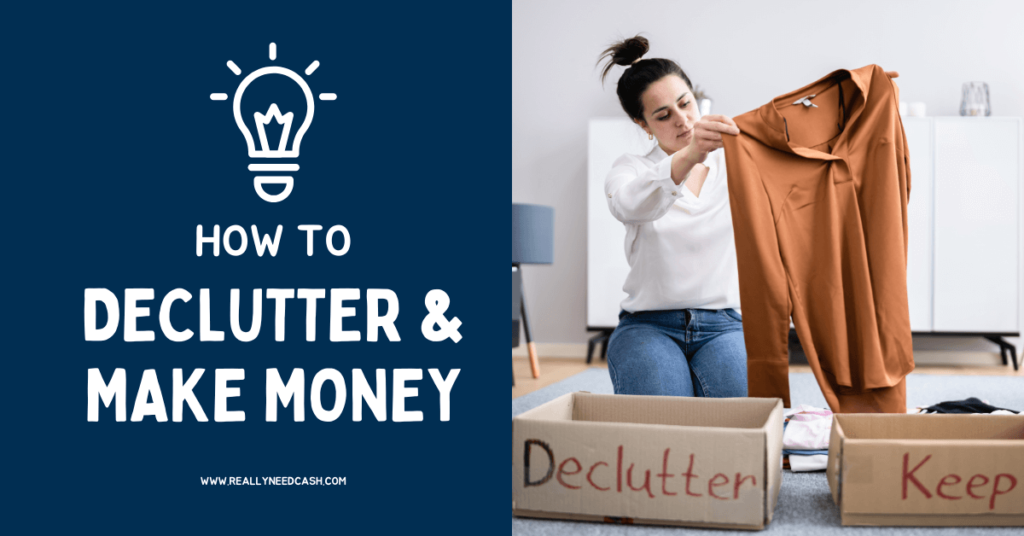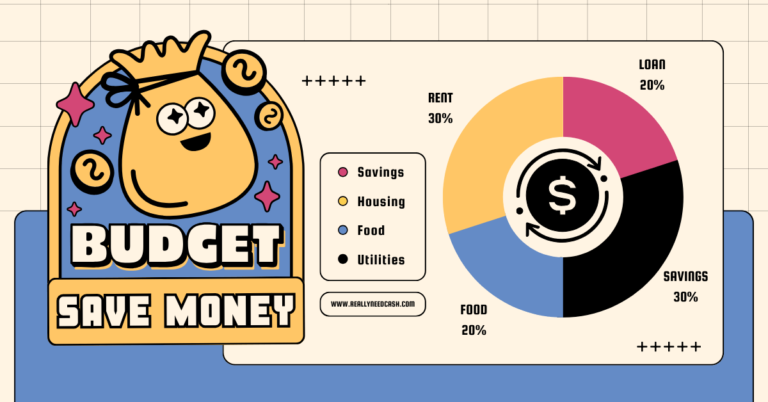To Declutter and Make Money: 1. Gather your used items, clothes, mobiles, furniture, laptops, gaming consoles, and Books. 2. Post your listings on sites like Craigslist, and eBay and Arrange secure payment methods and shipping or pickup options for successful transactions.

How to Declutter and Make Money?
Step 1: Assess Your Possessions
Begin by evaluating your belongings to identify items that you no longer need or use. Consider the condition, relevance, and potential value of each item as you assess what can be decluttered and potentially sold.
Step 2: Organize and Sort
Systematically organize your possessions into categories such as clothing, electronics, furniture, and collectibles. Sort items into piles for keeping, donating, selling, or discarding based on their condition and usefulness.
Step 3: Research Market Value
Research the market value of items you intend to sell. Utilize online platforms, such as eBay, Craigslist, or specialized marketplaces, to gauge the selling prices of similar items and determine their potential worth.
Step 4: Choose Selling Platforms
Select the most suitable selling platforms based on the type and condition of your items. Utilize online marketplaces, local buy/sell/trade groups, consignment shops, or organize a garage sale to reach potential buyers.
Step 5: Prepare Items for Sale
Clean, repair, or refurbish items to enhance their appeal and value to potential buyers. Take high-quality photographs and write detailed, accurate descriptions to effectively showcase the items for sale.
Step 6: Set Reasonable Prices
Determine fair and competitive prices for your items based on their condition, market value, and demand. Consider offering discounts for bulk sales or bundling related items to attract buyers.
Step 7: Promote Your Listings
Effectively promote your items for sale by leveraging social media, local community boards, and online marketplaces. Share appealing images and engaging descriptions to attract potential buyers.
Step 8: Manage Sales Transactions
Communicate promptly with interested buyers, address inquiries, and negotiate prices when necessary. Arrange secure payment methods and shipping or pickup options for successful transactions.
Step 9: Organize a Garage Sale
If applicable, organize a garage sale to sell multiple items at once. Advertise the sale locally, set up an organized display, and be prepared to negotiate prices with potential buyers.
Step 10: Donate Unsold Items
After your selling efforts, consider donating any unsold items to local charities or organizations in need, ensuring that your decluttering efforts contribute positively to the community.
How to Efficiently Declutter Your Home?
Identify Clutter Hotspots
Before you start decluttering, it’s essential to identify the main clutter hotspots in your home. Common areas that accumulate clutter include the kitchen, living room, bedroom, pantry, and fridge. Make a list of these areas and prioritize them based on your personal preferences and the degree of clutter.
The Decluttering Process
- Gather supplies: To begin decluttering, ensure you have the necessary supplies such as garbage bags, storage containers, and cleaning materials.
- Sort items: As you work through each area, sort items into three categories: Keep, Donate, and Toss. Be decisive and practical when deciding what to keep; consider the item’s usefulness and sentimental value.
Items to consider for decluttering are:
- Clothes: Check for items that no longer fit, are damaged, or you haven’t worn in the last year.
- Kitchen appliances: Simplify your kitchen space by eliminating unused or duplicate appliances.
- Storage space: Organize your storage areas by removing items you don’t need or use.
Bonus TIP: Hosting a garage sale or selling items online can help you make money while decluttering.
- Clean the space: Once you’ve removed the clutter, take the opportunity to clean the area thoroughly.
Organizing Post-Declutter
After the decluttering process, it’s crucial to find an organizational system that works for you to keep your space clutter-free.
- Assign a home: Determine a specific place for each item, and always return it after use.
- Label items: Labeling containers and storage spaces can help you quickly locate what you need and maintain tidiness.
- Create a routine: Set up a regular schedule for decluttering and organizing to prevent clutter from building up again.
By following these simple steps, you’ll be well on your way to effectively decluttering your home, organizing your belongings, and even making some money in the process.
Turning Clutter into Cash
Decluttering your home can not only free up space but also make you some extra cash. By identifying valuable items, pricing them correctly, and choosing the right platforms for selling, you can turn your unwanted clutter into cold, hard cash.
Identify Valuable Items
Before you start selling, go through your belongings and identify items that have value. Some common items you can sell include:
- Books: Novels, textbooks, or collector editions
- Electronics: Smartphones, computers, or gaming consoles
- Furniture: Couches, tables, or shelves in good condition
- Toys: Vintage toys, collectible figurines, or board games
- Clothing: Designers, antiques, or unique clothing items
Remember that some items have higher resale value, such as antiques or rare collectibles. Keep an eye out for these treasures as they can bring in more profits.
Pricing Your Items
Once you’ve identified your valuable items, you’ll need to price them appropriately. To do this, consider the following:
- Research: Look up similar items on platforms like eBay or Craigslist to get an idea of their market value.
- Condition: Adjust the price based on the item’s condition. Items in excellent condition should be priced higher than those with visible wear.
- Expenses: Factor in any expenses you might incur, such as shipping costs or platform fees.
- Negotiation: Be prepared for potential buyers to negotiate, so you might want to price items slightly higher to account for this.
Platforms for Selling
There are many different platforms where you can sell your clutter, each with its own benefits and drawbacks:
- eBay: A popular online auction site perfect for selling anything from electronics to clothing. Keep in mind that eBay charges fees for listing and selling items.
- Craigslist: A classified ads platform that’s great for selling larger items like furniture locally. There are no fees, but dealing with potential scammers is a risk.
- Facebook Marketplace: This platform is useful for selling items within your local community without fees. However, you might face competition from other sellers.
- Garage/Yard Sale: A more traditional option that allows you to sell directly to buyers without any online hassle, but might be time-consuming to organize.
- Consignment Stores: These stores sell your items for you and take a percentage of the profits. Ideal for clothing and accessories.
- Specialized Platforms: Sites like OfferUp, Poshmark, or specialized forums cater to specific item categories and might attract niche buyers.
By carefully identifying, pricing, and choosing the right platform for your items, you can effectively turn your clutter into cash and create a more organized living space.
Donations and Consignments
How to Donate
Donating items, such as clothes, home decor, or household items, is a great way to declutter and make a positive impact. To donate, follow these steps:
- Gather items: Collect the items you want to donate, making sure they are in good condition and clean.
- Choose a donation center: Research local charities, thrift stores, or shelters to find a suitable donation center. Some organizations even offer pick-up services for larger items or multiple donations.
- Organize items: Organize your items to make it easier for donation center staff to sort through. For example, separate clothes from home decor and pack them in separate bags or boxes.
- Deliver donations: Take your items to the donation center during their business hours, or schedule a pick-up if the service is available.
Remember, donating not only helps declutter your space but also benefits people in need by providing them with essential items for free or at a low cost.
Finding Consignment Stores
Consigning items, such as designer clothes, shoes, purses, or even games and craft supplies, can help you declutter and make some money in the process. Here are a few tips for finding consignment stores:
- Local search: Use search engines or local directories to find consignment stores in your area.
- Specialties: Some consignment stores specialize in specific items. For example, consignment shops may focus on high-end clothing, children’s items, or home decor. Choose a store that matches your items to increase the chance of a successful consignment.
- Research store policies: Each consignment store has its own policies regarding payouts, item condition, and consignment length. Make sure to research and select a store that best suits your needs.
- Read reviews: Look for reviews from customers or sellers who have worked with the consignment store before to get an idea of their experience. This can help you decide which store to choose.
By consigning your items, you not only clear out your space but also make some profit off the items you no longer need.
Maintaining a Clutter-free Space
Simplifying your home is an essential step towards achieving a clutter-free space. Start by setting a routine to regularly declutter areas in your home. Spend 10 minutes a day focusing on one area and watch your space transform over time. This approach makes the task less overwhelming and helps you stay in control of your living environment.
- Organize items by category – Group similar items together into designated storage spaces. This will allow you to quickly locate what you need and prevent unnecessary purchases.
- Establish space limits – Allocate specific storage spaces for your belongings and strive to keep within the defined limits. This ensures that you have a place for everything and prevents clutter from building up.
Additionally, creating a clutter-free space can help you save money in several ways:
- Prevents redundant purchases – When your belongings are organized, you’re aware of what you own and avoid buying duplicates.
- Items in good condition can be sold – Decluttering may reveal items you no longer need but are still in good condition. Consider selling these items online or through a garage sale to earn some extra cash.
- Donations qualify for tax deductions – Donating unwanted items to a charity can result in tax deductions, essentially saving you money while contributing to a good cause.
To ensure your space remains organized and clutter-free, stay in control by regularly cleaning and maintaining your home. Set aside time every week to clean and put things back in their designated places. This routine will help you easily maintain a neat and welcoming home, making it more enjoyable for you and your guests.
By implementing these decluttering tips and establishing organized habits, you’ll effectively maintain a clutter-free space in your home, saving money in the long run.
Remember: A clutter-free space doesn’t just happen overnight. It requires consistency and effort. Stay committed to your routine, and you’ll be well on your way to enjoying a simplified and organized home.
Why Declutter Your Home?
Decluttering your home not only enhances the aesthetics of your living space but also contributes to multiple positive psychological effects.
Here are some reasons why you should declutter your home:
- Reduce stress: A cluttered home can lead to increased stress levels. By decluttering, you can create a more peaceful environment that helps to minimize stress and anxiety.
- Enhance focus and motivation: Clutter can be distracting and hinder productivity. A clean and organized space fosters better focus and boosts motivation to accomplish tasks efficiently.
- Gain control: Decluttering allows you to regain control over your living space and belongings. Knowing where every item is can save you time and effort in the long run.
- Improve mental well-being: A clutter-free space contributes to peace of mind, promoting overall mental well-being. A tidy environment often reflects a well-organized mind.
Mental Benefits of Decluttering
- Reduced stress levels
- Increased focus and motivation
- Gained control over your living space
- Improved mental well-being
Decluttering can also provide you an opportunity to make some money. When sorting through your belongings, you may come across items that are no longer needed or used.
Selling such items in garage sales or online marketplaces can add some extra cash to your wallet.
Frequently Asked Questions
What items can I sell to declutter my home?
To declutter your home and make money, consider selling items such as gently used clothing, shoes, accessories, electronics, appliances, furniture, toys, sports equipment, and books. Keep an eye out for items that are in good condition, have value, and are no longer used or needed.
Which platforms are best for selling my clutter?
There are various platforms for selling your clutter, depending on the type of item and your location. Some popular options include:
- eBay: for selling a wide range of items, including collectibles and electronics.
- Poshmark or Depop: for clothing, shoes, and accessories.
- Facebook Marketplace or Craigslist: for local sales of furniture, appliances, and larger items.
- Etsy: if you have vintage or handcrafted items.
- OfferUp and Letgo: for selling various items locally.
- Amazon: for books, electronics, and other products.
What is an effective way to decide what items to sell?
Use the following questions to help identify items to sell:
- Have I used this item in the past year?
- Does it hold any sentimental value, or is it replaceable?
- Is it in good condition or can it easily be refurbished?
- Do I have multiples of the same item?
Items that don’t meet these criteria are good candidates for selling.
How do I price my items to maximize profit?
To price your items effectively:
- Research similar items: check selling platforms, such as eBay, to see the average price of similar items.
- Consider the item’s condition: adjust the price accordingly if it’s in excellent or poor condition.
- Be realistic: understand that used items will sell for less than brand new ones.
- Be willing to negotiate: set a slightly higher price, and be open to offers.
What are the steps to decluttering and organizing my home?
- Set goals: Decide which areas of your home need decluttering and set a timeline to complete the process.
- Sort items: Sort belongings into categories like “keep,” “sell,” “donate,” or “discard.”
- Organize: Once you have identified items to keep, organize them effectively to prevent future clutter.
- Sell, donate, or discard: Find appropriate platforms to sell items, donate what you can, and discard anything damaged or unusable.
- Develop habits: Maintain a clutter-free home by regularly reassessing and organizing your belongings.
How can I repurpose items for extra cash?
Repurposing items is a great way to make extra cash by transforming them into something new or useful. Some ideas include:
- Refurbishing vintage furniture.
- Upcycling clothes into bags, quilts, or unique fashion pieces.
- Turn an old ladder into a bookshelf or pot rack.
- Create artwork from used materials, like a collage or sculpture.
Remember to put your creativity to work and keep an eye out for upcycling ideas and inspiration to make the most of your decluttering process.






